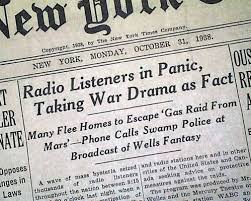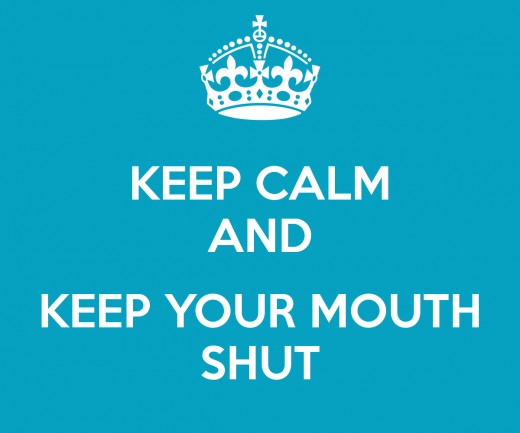Written Words Can be Taken Out of Context to the Point of an Argument
Panic Stricken People Take Orson Wells Radio Speaking and Think it is Real

How One Story Became a Nightmare
Orson Welles causes a nationwide panic with his broadcast of "War of the Worlds"—a realistic radio dramatization of a Martian invasion of Earth.
Orson Welles was only 23 years old when his Mercury Theater company decided to update H.G. Wells' 19th-century science fiction novel War of the Worlds for national radio. Despite his age, Welles had been in radio for several years, most notably as the voice of "The Shadow" in the hit mystery program of the same name. "War of the Worlds" was not planned as a radio hoax, and Welles had little idea of the havoc it would cause.
The show began on Sunday, October 30, at 8 p.m. A voice announced: "The Columbia Broadcasting System and its affiliated stations present Orson Welles and the Mercury Theater on the air in 'War of the Worlds' by H.G. Wells." (Today in History)
As you can see this broadcast caused a big uprising to our nation thinking that the world was being invaded by mars. People ran and screamed and thought we were being attacked by Martians. In the end he must have felt like a jerk to make people really believe that this was happening.
Misunderstanding the Meaning of Words
As a writer, it is not always easy to get a reader to follow the meaning that is conveyed in an answer or a story because everyone has their own interpretation of how it is presented.
Sometimes one word will seem to make someone so mad that they won't take a moment to realize that what was said was not meant to be mean, thus causing a big blow up that never needed to happen.
In public forums such as facebook, myspace and yes even here on hub pages, there are times when people will get out of hand because they misunderstood what someone was saying and started a bunch of hoopla for absolutely no reason.
Especially when one talks about religion, politics, or government.
Each person has a different way of taking in information and redistributing it to mean what is right to them. But that doesn't mean that the way you conveyed it is the way the writer proposed it to be.
I would think that before flying off the handle with due respect, it would be better to ask the person what did you mean by that then assume they were attacking you, being mean or rude. They might not have meant anything by what they said or might have meant it entirely different then it was typed.
You see when you are dealing with a public forum and you don't know the person personally and do not know their personality, it is unfair to convey what they write to the way you want it to be. We all are individuals, adults, with a mind of our own and sometimes some people need to mind their own business instead of making it up as they go.
It's bad enough that we have to live in uncertain times, but now be at the hands of people we don't even know commenting on things they know nothing about or how we wanted it to come across.
Why should anyone have to take abusive attitudes towards people they don't know? That is how people get killed for mouthing off about something they had no idea about.
Be respectful to people's comments or words they write and if you're doubting the way it sounds then ask instead of adding insults. I always try to convey what I mean to my readers, but sometimes it does not come across to people in the way I intended it to be. This is a normal process but it doesn't have to make people be disrespectful to each other.
If in doubt ask. Don't Assume!
This Speaks Volumns

Getting Your Point Across
When we're trying to get a point across to someone else we often think long and hard about what we want to say. That is the wrong way to go about it. Instead of focusing on what you want to say to get your point across, you should focus on what you want the other person to hear.
Countless books and articles have been written that explain why sending the right message is so important and teach you how to send exactly the message you want to send. Their authors stress the importance of being concise, precise, and specific in choosing your words, regardless of whether you write them or speak them. They tell you that this is the best way to get your point across to your audience. By F. John Reh Updated August 12, 2016
Think Before Speaking
A simple sentence such as "The CEO of this company is not doing a good job" could mean different things to different people. One could take this statement and think I am being negative towards the CEO another could agree and ad more fuel to the fire and someone else could careless about the sentence and has no words to argue the point.
The first two people will go back and forth of why they are right. It will ensue into an all out war because everyone is right. The author of the sentence was merely stating her own opinion about the CEO not thinking she would get jumped in the parking lot thinking what she said was fine.
What is not fine about this is that people need to ask what did you mean by that instead of assuming that the author just hates the CEO and will smear his face in the mud any chance they can get.
As an author who is very opinionated, I have on many occasions been taken the wrong way. Especially over this last election and the devastations of a hurricane. You might think I vowed to have a mass killing by the statements I made. You can't hate people for their opinion. It's our right to have an opinion but you don't have to agree with it.
Don't Read Between the Lines

Don't Be So Sensitive
People have been talking and writing since the beginning of time. If you do not know the persons personality then you can't assume how they feel. I have been the victim of a good bashing but words don't hurt me.
If you don't understand what that person is trying to say which always happens to someone then its better to keep your mouth shut and your fingers off your keyboard.








